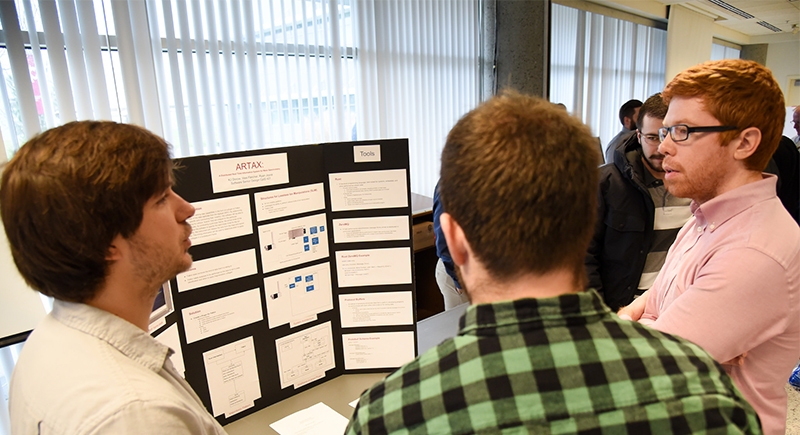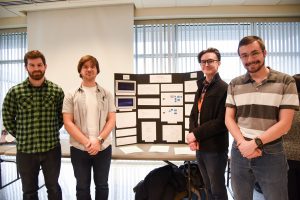
May 24, 2018 WSU, PNNL software team focuses on detecting cancer biomarkers in real time
By Maegan Murray, WSU Tri-Cities
RICHLAND, Wash. – Computer science students at Washington State University Tri-Cities are partnering with the Pacific Northwest National Laboratory to create a software that will improve data processing to help identify cancer and other health biomarkers in real-time.
The Pacific Northwest National Laboratory is currently researching how to use mass spectrometry, which is a technology that allows scientists to identify individual molecules and components in materials such as blood, tissue samples and more, to identify health biomarkers that are indicative of disease and infection in real time. But with this process, thousands upon thousands of individual components and data points have to be processed.

From left: Computer science students Wes Fletcher, Ryan Joyce, their PNNL mentor Spencer Prost and student KJ Dorow pose next to their presentation board discussing their software project that will help identify cancer biomarkers through PNNL technologies.
The WSU Tri-Cities student- and PNNL-created software will allow scientists and medical professionals to instantaneously filter the data points pertaining to those biomarkers and potentially result in a quicker medical diagnosis.
“It can tell you those biomarkers then and there instead of you having to send your blood sample off to a lab and having to wait an uncertain amount of time to get it back,” computer science student Ryan Joyce said.
The technology would be implemented within PNNL’s existing technological framework for specifically what is called Structures for Lossless Ion Manipulation, which is used to improve ion mobility spectrometry technology. The ion mobility spectrometry technology is used for separating and characterizing ions and is widely used in chemical analysis.
The student team, which consists of Joyce, KJ Dorow and Wes Fletcher, worked with their project mentor and PNNL software engineer, Spencer Prost, to develop the software as part of their senior capstone course at WSU Tri-Cities.
Prost said working with a student team to improve processes within their existing technological framework presents an ideal partnership, as it allows a different set of minds to work on a real-world problem that has large impacts.
“The students are not only building a platform that can be expanded upon further by students, but also by PNNL staff,” Prost said. “These types of cooperations are very important to PNNL as we need experienced minds, but we also need the young blood to drive those innovations. It takes the minds of both.”
The students said while the project certainly presented a large challenge, they enjoyed working through the issues of the software to come up with a viable solution that can be implemented in a real-world technology.
“It’s simple in nature, but also really complicated,” Fletcher said of their software. “Handling the flow of information at the rate at which is has to process that information is difficult. But it’s been a great project. It’s cool to know that this could help with cancer diagnoses.”





